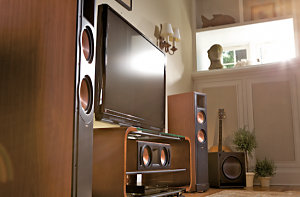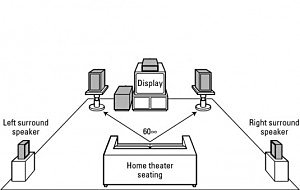4 Ways Your Home Theater Speaker Placement Is All Wrong
So, you finally made the decision to invest in an epic home theater system.
You spent hours researching high quality speakers. And you’re a movie buff so you even decided to splurge on a killer center channel speaker.
All good choices.
But then you test it out and you don’t even make it past the MGM lion roar before you notice something is off. The sound is unbalanced, the bass is boomy and you’re missing important dialogue.
So, what’s wrong?
The most likely answer is your speaker placement.
The good news is that with a few tweaks you can get the movie-watching experience you deserve.
Let’s look at 5 big mistakes you’re making when it comes to speaker placement and how to fix them.
Mistake #1: Your center speaker isn’t at ear level
The center channel speaker projects the dialogue and is one of the most important speakers of your home theater system.
Most homeowners know that the center speaker should be placed (you guessed it) at the center of the system- either above or below the tv.
But all too often we see center speakers sitting on the ground.
Why is this a problem?
Center speakers are very directional so projecting the dialogue lower than ear level makes characters sound “boxy” or unintelligible- especially at mid to high frequency sounds.

Example of a center speaker placed too low. Photo source: Klipsch.com
The fix: Place your center speaker at ear level when seated. This is usually around 30” to 50” off the ground.
If your theater set up doesn’t allow you to place the center speaker this high, you can improve the sound of a low positioned speaker by tilting it up so that the sound fires at your ear level.
Mistake #2: You’re placing your speakers inside furniture
A lot of homeowners choose aesthetics over logic when it comes to their home theater set up. The common temptation is to hide front speakers in the entertainment center or other furniture.
Why is this a problem?
Placing a speaker inside a cabinet or partially enclosed fixture obstructs its sound waves, and this muddles the noise.
Think about it: wouldn’t you sound less intelligible and natural if you spoke while cupping your hands around your mouth? The same logic applies to your speakers.
The fix: Avoid placing any of your speakers inside furniture for cleaner, more precise sound.
If you have to place your speaker inside furniture, make sure to pull out the speaker until it sits flush with the front edge.
Mistake #3: Your front speakers are placed against the wall
The natural tendency is to place your front speakers directly against the wall. But we advise against that.
Why?
Placing your front speakers flush with the wall detracts from the theater experience in 2 ways:
It decreases the accuracy and detail of noise because the speakers sit farther away from viewers.
It increases the amount of reflected sound waves bouncing of the side walls because the speakers face straight instead of angled toward the viewer (called “toeing in”).
(Learn more about how the “toe in” angle affects your home theater)
The fix: Move your left and front speakers at least 2 feet into the center of the room and away from the wall.
We also suggest that you experiment with “toeing in” your front speakers. Play with the angle of the speakers and listen to the sound quality from your normal sitting position. Determine the angle that suits your room and home theater best.
Mistake #4: You’re placing your surround speakers too low
Most homeowners think the rules for surround speakers are the same as your front speakers: place it at ear level.
But ear-level placement for surround speakers actually detracts from your movie-watching experience.
Why?
Surround speakers deal with conveying the “ambient noise” in movies, such as background noises like birds chirping, cars passing, etc. So, placing surround speakers at ear level results in unnatural, distracting ambient noises.
You don’t want to be overwhelmed by these noises; they should float in and out naturally throughout the course of the movie, and you shouldn’t be able to pinpoint where the sound is coming from.

In this example of a 5.1 system, the left/right surround speakers are too low and hit the viewers directly at ear level.
Photo Source: Dummies.com
The fix: Place your surround speakers slightly behind the viewer’s sitting position but make sure they are at least 2-3 feet above ear height.
Talk to an Atlanta Home Theater Installation Expert
Want more tips on how to correctly set up your home theater system? We can help. Just contact us online or give us a call and speak to a live professional who was trained to help you.
Related Reading
Subscribe To Our Newsletter
Get up-to-date current news, promotions, and industry tips.
